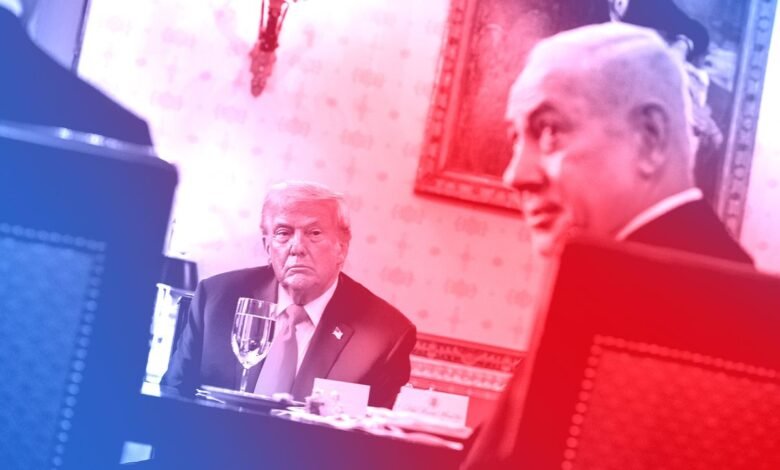
On Monday, during a visit to one of his two Trump-branded golf courses in Scotland, Donald Trump sat alongside the U.K. Prime Minister, Keir Starmer, and stated a fact that should be painfully obvious to an avid cable-news watcher such as himself: there is “real starvation” happening in Gaza as a result of Israel’s continuing war against Hamas. “Based on television,” he had said on the way into the press conference, “those children look very hungry.” He promised to work with European allies to address the crisis, and mentioned something about “food centers.” This was portrayed as a direct rebuke to his close ally, Israel’s Prime Minister Benjamin Netanyahu, who had earlier claimed, evidence be damned, that there was “no starvation” in the war-torn strip, where fighting has continued largely without interruption since the Hamas terrorist attack on southern Israel on October 7, 2023. When asked about Starmer’s decision to join France in recognizing Palestine as an independent state, Trump all but gave him one of those famous Trumpian thumbs-up signs. “I’m not going to take a position,” the President told reporters. “I don’t mind him taking a position.”
But by Thursday, Trump was back in a familiar role—not only defending Israel but explicitly linking his economic policies to continued support for it. “Wow!,” Trump posted on his social-media site, “Canada has just announced that it is backing statehood for Palestine. That will make it very hard for us to make a Trade Deal with them. Oh’ Canada!!!” In the intervening days, Trump had dispatched his all-purpose envoy, Steve Witkoff, to Israel, prepared a new round of sanctions on the Palestinian Authority, and let it be known that recognizing Palestine was equivalent to giving Hamas a victory. An easy but insufficient explanation for the wild reversals is that this is just Trump being Trump, a creature of the news cycle, whose attention is captured by horrific pictures emanating from a war zone on a Monday but whose opportunistic cynicism causes him to take an entirely different stance a few days later when he senses an opening in a hard-fought negotiation.
But casting this as merely the flip-flopping of a noted flip-flopper strikes me as a bit beside the point. Trump’s overheated promises on Israel—as with his pledge to take swift, transformative action on Ukraine upon returning to the Presidency—have, for months, been colliding with a more complicated reality on the ground. Wars, it turns out, do not end magically because Trump clicks his heels and demands that they do so. In February, Trump declared that the United States would take over Gaza, “level it out,” displace its two million Palestinian residents, and build a new “Riviera of the Middle East” there—a fantastical vision he followed up on a few weeks later by sharing an A.I.-generated video of “Trump Gaza,” which featured gleaming new buildings along the territory’s dazzling Mediterranean coastline, a golden Trump-shaped balloon, and an image of the President and Netanyahu sipping cocktails on a beach.
I mention this embarrassment because Trump himself barely does anymore. (On Tuesday, as Trump was flying home from Scotland, a reporter on Air Force One asked about his idea to move Gazans out of Gaza; Trump still insisted “you could do something spectacular” there, though he allowed that “it’s a concept that some people fell in love with and some people don’t.”) Of course, Netanyahu and other allies never openly mocked Trump for his insensitive and ill-informed approach to a deadly conflict. They did what they’ve learned to do so well over the past decade: humor him, pretend to take him seriously, and distract him. In February, Netanyahu stood next to Trump and pronounced his Gaza Riviera plan a “worthwhile” idea that “could change history.” Even more problematically, some of the more extreme figures in Netanyahu’s Cabinet have seized on Trump’s words as implicit approval for their own plans to depopulate Gaza and reannex the territory. “They believe Trump has given them license to pursue it,” Daniel Shapiro, the U.S. Ambassador to Israel during Barack Obama’s Presidency, told me on Thursday. In March, with Trump’s more or less full acquiescence, Netanyahu ended a ceasefire with Hamas that the U.S. had brokered in January. Israel’s full-scale war resumed and with it, a near-total blockade on much needed food aid and humanitarian assistance for Gaza’s people—setting the stage for the horrific images of starving kids we are now seeing.
The photos have provoked political blowback for Israel not only among Democrats in Washington—twenty-seven Democratic senators, a majority of their caucus, voted unsuccessfully on Wednesday night to block new shipments of military aid to Israel—but also among increasingly loud segments of Trump’s MAGA Republican coalition. The publication Jewish Insider called this “bipartisanslip,” and signs of the G.O.P.’s internal discord include Tucker Carlson devoting time on his show to a discussion of Israeli war crimes and the fervent MAGA congresswoman from Georgia, Marjorie Taylor Greene, becoming the first House Republican to accuse Israel of committing “genocide.” Over all, a new Gallup poll published this week showed that just a third of Americans—a new low—support Israel’s military action in Gaza. But backing for the war remains far stronger among Republicans, a reminder of Trump’s dilemma here—the pictures on the TV are devastating, but he can’t just walk away from the unwavering support for Israel that has, in recent years, become a central ideological pillar of his party.
What’s left unsaid by those Republicans now questioning Israel’s conduct, though, is the extent to which Trump has exacerbated conditions on the ground for Gaza’s civilians. For those in Washington, on the left and on the right, who still support Israel, a new fear has emerged as a result—that a Trumpian blank check for Netanyahu may be the worst thing possible for Israel. “He bears a lot of responsibility for where we’ve arrived at, including how negative the consequences have been for Israel, in terms of the pressure that’s now on it and the reputational damage it’s now enduring,” Shapiro told me.
As Shapiro observed, Israel’s wars of the past few decades—and there have been many—have tended to end only when a “U.S.-scripted off-ramp” has been put together. It’s become the nature of the political dynamic between America and its embattled ally that “the Israeli Prime Minister has to look like he’s being forced to do it by the United States. It’s almost built into the DNA.” And yet there is little sign that Trump, even with his critical words this week about famine in Gaza, is prepared to do any forcing at all.
The problem, Aaron David Miller, a veteran Middle East peace negotiator, who served under six U.S. Secretaries of State, told me, is not that Trump won’t confront Netanyahu but that he is too often mistaken for an ideological supporter of Israel rather than a pragmatic “situationalist,” one whose “gut” and “instincts lend him to a view of enabling and acquiescing in what Netanyahu is doing.” The point, as Trump put it on Thursday, is for Israel, somehow, to “finish the job.” And where does that lead? It bears remembering Trump’s advice to Israel only a few months ago when faced with Hamas’s intransigence: “let all hell break out.”
Given the reality of a war that has gone on now for nearly two years, however, neither an all-out victory nor an all-out deal seems realistic. A likelier scenario for the moment is that Trump and Witkoff will find a way to cut a new interim accord, enabling a bit more humanitarian aid to get through, perhaps forcing Hamas to release more of the remaining hostages. “In government, we say the memo has three options—breakthrough, breakdown, and muddle through,” Miller said, “and Donald Trump has chosen the muddle-through option on Gaza.” Nobel Prize-worthy, it isn’t.
In a summer of horror for Gaza, it’s hard to recall the unfulfilled promises of last winter, when Trump bragged, in near world-historical terms, of the “EPIC” ceasefire that he and his team had helped broker. Now, as Trump stands by and does close to nothing at all, what can we do but wish that he had, for once, been right? ♦



